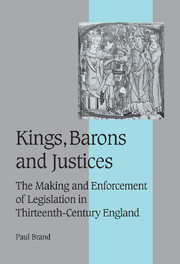Book contents
- Frontmatter
- Contents
- List of tables
- Preface
- List of abbreviations
- INTRODUCTION
- Part I Politics and the legislative reform of the common law: from the Provisions of Westminster of 1259 to the Statute of Marlborough of 1267
- Part II Beyond politics: the enforcement and interpretation of the Statute of Marlborough in the courts, 1267–1307
- Chapter 8 CONTRA FORMAM FEOFFAMENTI: THE STATUTORY ACTION FOR TENANTS CONTESTING LIABILITY TO SUIT OF COURT AFTER 1267
- Chapter 9 OTHER MECHANISMS FOR THE ENFORCEMENT OF CHAPTER 9; OTHER REFORMS AFFECTING THE LORD–TENANT RELATIONSHIP
- Chapter 10 REFORMS IN THE CRIMINAL JUSTICE SYSTEM
- Chapter 11 REFORMS IN THE PROCEDURES OF THE ROYAL COURTS
- Chapter 12 THE EXTENSION OF EXISTING REMEDIES
- Chapter 13 ENFORCING THE ACCOUNTABILITY OF SOCAGE GUARDIANS
- Chapter 14 CONTROLLING THE USE OF DISTRAINT
- Chapter 15 REMEDYING ABUSES IN THE OPERATION OF LOCAL COURTS
- Chapter 16 CONCLUSIONS
- Appendix I TEXT AND TRANSLATION OF THE PROVISIONS OF WESTMINSTER OF 1259
- Appendix II TEXT AND TRANSLATION OF THE PROVISIONS OF WESTMINSTER AS REISSUED IN 1263 AND 1264
- Appendix III TEXT AND TRANSLATION OF THE STATUTE OF MARLBOROUGH OF 1267
- Bibliography
- Index
- Cambridge Studies in Medieval Life and Thought Fourth series
Chapter 10 - REFORMS IN THE CRIMINAL JUSTICE SYSTEM
Published online by Cambridge University Press: 16 June 2009
- Frontmatter
- Contents
- List of tables
- Preface
- List of abbreviations
- INTRODUCTION
- Part I Politics and the legislative reform of the common law: from the Provisions of Westminster of 1259 to the Statute of Marlborough of 1267
- Part II Beyond politics: the enforcement and interpretation of the Statute of Marlborough in the courts, 1267–1307
- Chapter 8 CONTRA FORMAM FEOFFAMENTI: THE STATUTORY ACTION FOR TENANTS CONTESTING LIABILITY TO SUIT OF COURT AFTER 1267
- Chapter 9 OTHER MECHANISMS FOR THE ENFORCEMENT OF CHAPTER 9; OTHER REFORMS AFFECTING THE LORD–TENANT RELATIONSHIP
- Chapter 10 REFORMS IN THE CRIMINAL JUSTICE SYSTEM
- Chapter 11 REFORMS IN THE PROCEDURES OF THE ROYAL COURTS
- Chapter 12 THE EXTENSION OF EXISTING REMEDIES
- Chapter 13 ENFORCING THE ACCOUNTABILITY OF SOCAGE GUARDIANS
- Chapter 14 CONTROLLING THE USE OF DISTRAINT
- Chapter 15 REMEDYING ABUSES IN THE OPERATION OF LOCAL COURTS
- Chapter 16 CONCLUSIONS
- Appendix I TEXT AND TRANSLATION OF THE PROVISIONS OF WESTMINSTER OF 1259
- Appendix II TEXT AND TRANSLATION OF THE PROVISIONS OF WESTMINSTER AS REISSUED IN 1263 AND 1264
- Appendix III TEXT AND TRANSLATION OF THE STATUTE OF MARLBOROUGH OF 1267
- Bibliography
- Index
- Cambridge Studies in Medieval Life and Thought Fourth series
Summary
This chapter looks at the ways in which the various different chapters of the Statute of Marlborough concerned with reforms in the system of criminal justice, at both a national and a local level, were enforced and interpreted during the four decades after 1267.
MURDRUM FINES
Clause 22 of the Provisions of Westminster of 1259 had restricted the incidence of the murdrum fine to felonious homicides and prohibited its imposition in the case of accidental deaths. This clause was re-enacted in 1267 without alteration as chapter 25 of the Statute of Marlborough. The re-enactment was immediately reflected in statements made during eyres in 1268 by three counties as to the local custom regarding the presentment of Englishry. In each of them the limitation on the duty to present Englishry to felonious deaths was ascribed variously to the ‘king's concession to the county’ or to the operation of the ‘king's grace’. Both are clearly references to the statutory provisions. In a further eleven counties the first recorded statement of the county about its customs in the presentment of Englishry made after 1267 specifically excluded presentment for accidental deaths and, by implication, thereby also excluded the payment of murdrum in such cases. In another five counties, although the justices rejected the statement of custom about Englishry made by the county as contrary to that given in previous eyres, the custom of the county, as stated by the justices themselves, specifically excluded accidental deaths.
- Type
- Chapter
- Information
- Kings, Barons and JusticesThe Making and Enforcement of Legislation in Thirteenth-Century England, pp. 282 - 301Publisher: Cambridge University PressPrint publication year: 2003
- 1
- Cited by



